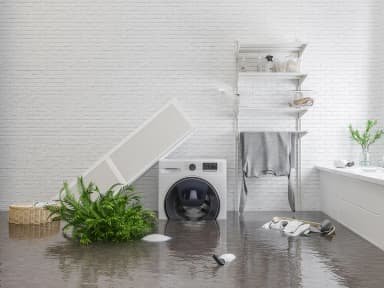Experiencing an emergency flood can be overwhelming, but knowing what to do immediately can save lives and minimize damage. Floods strike quickly, often leaving little time to react. Preparing mentally and acting decisively is critical. This guide will outline practical steps to take during an emergency flood and when dealing with a home flood, ensuring you stay safe and reduce property loss.
How Do You Stay Safe During an Emergency Flood?
When floodwaters rise, your first priority should always be personal safety. Avoid panic and follow these essential actions:
-
Move to Higher Ground Immediately
If you notice rising water levels around your home or neighborhood, head to higher ground. Avoid basements or low-lying areas that can fill rapidly with water. Even a few feet of elevation can make a significant difference in safety. -
Avoid Walking or Driving Through Floodwaters
Just six inches of moving water can knock over an adult, and one foot can sweep a vehicle away. Always seek alternative routes and do not underestimate the power of floodwaters. -
Listen to Official Updates
Tune into local radio, TV, or emergency alerts on your phone. Emergency management authorities often provide real-time updates on flood warnings, evacuation orders, and safe zones. Ideal Response recommends setting your devices to receive alerts automatically to stay informed during a flood.
What Should You Do to Protect Your Home During a Home Flood?
While your safety is the top priority, you can take immediate steps to reduce damage to your property if a home flood is imminent:
-
Turn Off Utilities
Switch off electricity, gas, and water to prevent electrical hazards and further damage. Do not touch electrical equipment if you are wet or standing in water. -
Move Valuables to Higher Areas
Place important documents, electronics, and irreplaceable items on upper floors or elevated surfaces. Water can rise quickly, so acting early is crucial. -
Seal Entry Points Where Possible
Use sandbags or temporary barriers to block water from entering doors and windows. While this won’t stop severe flooding, it can help reduce water damage to critical areas of your home.
How Should You Prepare for an Emergency Flood in Advance?
Preparation is the best defense against the chaos of a flood. Even before a storm hits, consider the following steps:
-
Create an Emergency Plan
Map out escape routes and designate a meeting point for family members. Include a plan for pets, as they often require special considerations during evacuation. -
Assemble an Emergency Kit
Stock your kit with essentials such as bottled water, non-perishable food, a flashlight, batteries, a first-aid kit, and necessary medications. Include waterproof containers for documents and electronics. -
Stay Informed About Flood Zones
Understand your neighborhood’s flood risk. Communities in low-lying areas or near rivers should pay particular attention to flood alerts and evacuation orders.
What Actions Should You Take During an Active Home Flood?
When water starts entering your home, acting quickly can reduce property loss and prevent injury:
-
Evacuate if Necessary
If authorities issue an evacuation order, leave immediately. Do not wait for water to reach your door. Take your emergency kit and important belongings if it is safe to do so. -
Avoid Contact with Contaminated Water
Floodwater often contains sewage, chemicals, and debris. Wear protective clothing if you must move through it, and avoid ingesting or coming into prolonged contact with floodwater. -
Notify Others
Inform neighbors or family members about your status. If you cannot evacuate immediately, let authorities know your location so they can prioritize rescue operations.
How Can You Protect Your Family and Pets During an Emergency Flood?
Safety extends beyond yourself. Take proactive steps to safeguard your family and pets during a flood:
-
Designate a Safe Room
If evacuation is impossible, identify a safe room on the highest floor of your home. Bring supplies, blankets, and a means of communication to stay informed. -
Ensure Pets Are Accounted For
Keep pets in carriers or secure areas. Include pet food, water, and medications in your emergency kit. Remember, pets often panic during floods, so maintaining calm is essential. -
Teach Flood Safety to Children
Educate children about the dangers of water, the importance of staying indoors, and following your family’s emergency plan.
When Should You Call for Professional Help During a Home Flood?
Flooding can cause extensive structural damage, and professional intervention is often necessary:
-
Contact Emergency Services
Call 911 if anyone is in immediate danger. Professional responders have the equipment and training to manage rescue and evacuation safely. -
Call Flood Recovery Experts
After the waters recede, contact professional restoration services like Ideal Response. Experts can assess damage, prevent mold growth, and restore your home safely. -
Document Damage for Insurance
Take photos and videos of damaged areas for insurance claims. Accurate documentation can accelerate the recovery process and ensure you receive proper compensation.
How Do You Stay Calm and Focused During an Emergency Flood?
Maintaining composure is critical in any disaster situation. Panic can lead to poor decisions and put lives at risk. Try these strategies:
-
Follow a Clear Plan
Stick to your pre-established emergency plan. Knowing what to do next reduces stress and improves your response. -
Communicate Clearly
Keep family and neighbors informed about your situation. Use text messages or social media if phone lines are overloaded. -
Prioritize Safety Over Property
Remember that no possession is worth risking your life. Focus on evacuation and survival before attempting to salvage belongings.
Conclusion: Immediate Action Saves Lives During an Emergency Flood
Experiencing an emergency flood or home flood requires decisive action. By prioritizing personal safety, preparing in advance, and knowing when to seek professional help, you can significantly reduce risks. Always follow evacuation orders, avoid floodwaters, and protect your family and pets. After the flood, contact experts like Ideal Response to restore your home and return to normalcy efficiently. Remember, floods strike unexpectedly, and quick, informed action is your best defense against disaster.


